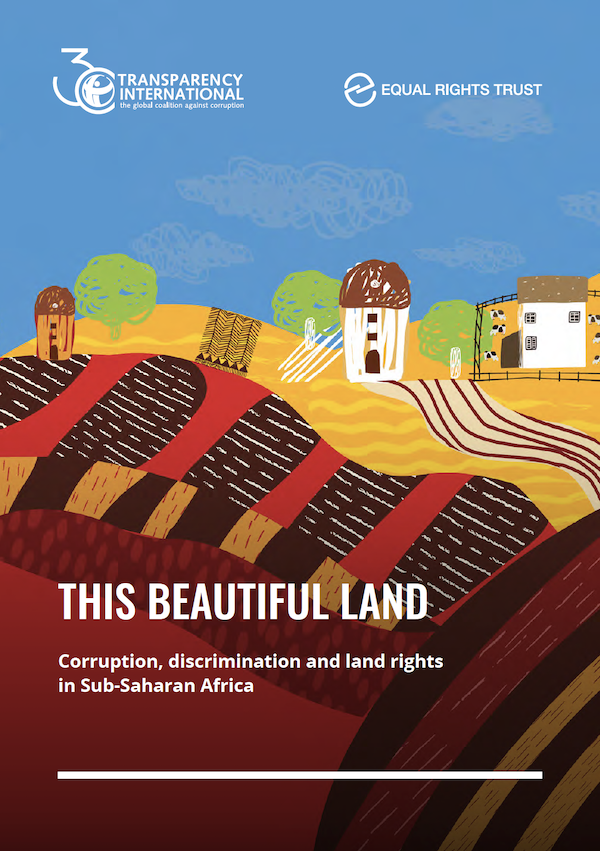The Land Portal Foundation, in partnership with Transparency International, hosted the webinar titled "Breaking New Ground: Insights and Stories on the Impact of Land Corruption on Discriminated Groups in Africa." The webinar brought together a panel of distinguished experts to delve into the challenges and complexities of corruption intertwined with discrimination in land rights and governance. This session provided crucial insights through detailed case studies and expert analyses, offering pathways towards more equitable land management practices.
Sharon Kiburi, a multimedia data journalist and regional network lead for the Africa-China Reporting Project, moderated the webinar. She opened the session by highlighting that the webinar aimed to dissect the barriers that corruption and discrimination pose to accessing land, particularly for the most marginalized and vulnerable populations.
Presentation by Sam Barnes
Sam Barnes, the Head of Research at the Equal Rights Trust, introduced the concept of discriminatory corruption, and shared findings from the report "This Beautiful Land: Corruption, Discrimination, and Land Rights in Sub-Saharan Africa." This report, a product of research across seven African countries, details how corruption and discrimination feed into each other, creating cycles that deeply entrenched these issues within land governance systems. Barnes’ presentation set the stage for a rich discussion by outlining the major dynamics of discriminatory corruption, including the overlap and perpetuation of corruption and discrimination, and the need for integrated solutions.
Panel Discussion: Global and Local Perspectives
The panel featured Barbara Codspoti from Oxfam Novib, Melusi Ncala from Corruption Watch South Africa, and Naome Kabanda from Uganda’s Ministry of Lands, Housing, and Urban Development. Each panelist provided a unique perspective:
- Barbara Codspoti discussed the global relevance of the issues, connecting local experiences of land corruption and discrimination to broader economic and historical contexts. She emphasized the influence of neoliberal economic policies and colonial legacies in shaping current land governance challenges.
- Melusi Ncala offered a South African perspective, focusing on the shortcomings of land equity programs intended to address apartheid-era inequalities. He shared specific instances where these programs failed due to corruption and poor implementation, underscoring the impact on marginalized communities.
- Naome Kabanda provided insights into the Ugandan context, explaining the government's efforts to enhance transparency and accountability in land governance. Kabanda highlighted the challenges faced in modernizing land management systems and the need for greater legal clarity and public education to combat land corruption effectively.
Recommendations and Strategies for Change
The webinar concluded with a series of recommendations aimed at tackling discriminatory corruption in land governance:
- Comprehensive Legal Reforms: Sam Barnes highlighted the necessity for laws that integrate anti-corruption and anti-discrimination measures, stressing the importance of legal frameworks that adapt to the specific challenges of marginalized groups.
- Enhanced Participation and Transparency: Barbara Codspoti called for increased community involvement in land governance processes and better access to information to ensure that land rights are protected and corruption is minimized.
- Government and Civil Society Collaboration: Panelists emphasized the role of collaboration between governments, civil society, and international organizations to foster better governance practices and protect the rights of disadvantaged communities.
Sharon Kiburi wrapped up the session by addressing audience questions, which ranged from inquiries about specific policies to requests for advice on implementing the recommendations discussed. The engagement from the audience highlighted the global concern for the issues of land corruption and discrimination and the urgent need for actionable solutions.
Conclusion
This webinar not only shed light on the intersecting challenges of corruption and discrimination in land governance but also sparked a conversation about innovative solutions that can lead to more just and equitable land management practices. The insights provided by the panelists underscored the necessity for a multi-faceted approach, integrating legal, educational, and technological tools to dismantle the systemic barriers faced by the most vulnerable groups in society.



